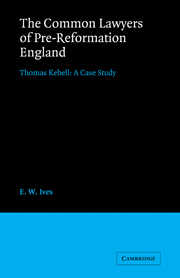Book contents
- Frontmatter
- Contents
- List of figures and tables
- Preface
- Abbreviations
- Manuscript sources
- Table of cases
- Introduction
- PART I THE LEGAL PROFESSION
- 1 The common lawyers in pre-Reformation England
- 2 Social origins: the Kebells of Rearsby
- 3 Training at the inns of court
- 4 Professional advancement
- PART II LEGAL PRACTICE
- PART III THE LAWYERS AND THE LAW
- PART IV THE PROFESSION AND SOCIETY
- Appendices
- Index
2 - Social origins: the Kebells of Rearsby
Published online by Cambridge University Press: 05 November 2011
- Frontmatter
- Contents
- List of figures and tables
- Preface
- Abbreviations
- Manuscript sources
- Table of cases
- Introduction
- PART I THE LEGAL PROFESSION
- 1 The common lawyers in pre-Reformation England
- 2 Social origins: the Kebells of Rearsby
- 3 Training at the inns of court
- 4 Professional advancement
- PART II LEGAL PRACTICE
- PART III THE LAWYERS AND THE LAW
- PART IV THE PROFESSION AND SOCIETY
- Appendices
- Index
Summary
In his panegyric on the English common law, Sir John Fortescue stressed that the law was a career for gentlemen. Neither the poor nor the common people could afford the expense of the training, while merchants, who could, needed to keep their capital in trade. Sir John was writing in 1470–1, at the age of eighty and after sixty years' experience in the profession. Was he correct? The sceptic will point to his great age and his ten years' exile from England and the courts. On the other hand, Fortescue clearly knew his lawyers; if anybody could tell us about them he could, provided he was not recalling a mythical golden age and provided that he told the truth, not what should have been the truth.
About the time Fortescue wrote De Laudibus Legum Anglie, a young lawyer was beginning to achieve some prominence, Thomas Kebell of the Inner Temple. He had been born about 1439, the third son of Walter Kebell of Rearsby, a village seven miles north-east of Leicester. His father was the local squire, but this was no distinction–Walter was the complete parvenu. A number of Kebles (the name is variously spelt) were prominent in the south of England during the fifteenth century, but Walter had no connection with any of them. As Bertha Putnam suggested, his most likely link is with a Coventry family whose earliest known member, John Kebell, contributed to the royal loan of 1424 and can be followed in the town's Leet Book until 1450.
- Type
- Chapter
- Information
- The Common Lawyers of Pre-Reformation EnglandThomas Kebell: A Case Study, pp. 23 - 35Publisher: Cambridge University PressPrint publication year: 1983



